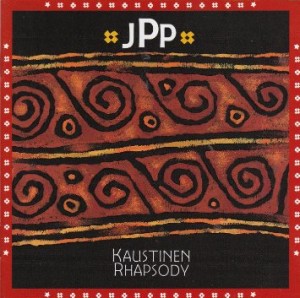 Brendan Foreman penned this review.
Brendan Foreman penned this review.
JPP — short for Järvelän Pikkupelimannit (“Little Folk Musicians of Järvelä”) — originally formed in 1983 as a local fiddle orchestra in the small town of Järvelä, Finland. Formed around the nucleus of 3 fiddlers, including leader Arto Järvelä, a harmonium player, and a bass player, they spent most of the Eighties and early Nineties gathering a devoted following in Finland and across the world and the reputation of being particularly inventive interpreters of Finland’s rich folk heritage. With the publication of Kaustinen Rhapsody, JPP proved itself to be excellent performers of contemporary music as well. In fact, this CD, with its generous peppering of American, Finnish, and Latino styles, demonstrates some of the universal appeal that traditional musics have across the world.
By the time Kaustinen Rhapsody was recorded, JPP had grown into a nine-piece orchestra — seven fiddlers with the original harmonium player and bass player. Also, for three tracks on this CD, they recruited seven additional fiddlers! (Again, most came from the Järvelä family). Apparently, JPP has since pared down to a paltry seven again.
There are plenty of Finnish tunes here to satisfy any hardcore traditionalist. The opening title track is an entertaining and rather sophisticated tour of Nordic styles, combining several familiar tune types of Scandinavia — marches, polskas, etc. The joyful “Haudanmaa Wedding March” has a graceful “bounce” to it, which matches well the event that it is meant to accompany. Another traditional tune is “Hjortingen,” a bewitching polska with a staggered rhythm to it. It is apparently most famous as a Swedish tune, although it has ties to Finland.
Another traditional tune here is “Valse Mysterioso.” The title is quite apropos; although the tempo is quite upbeat, the melody, played in unison by all seven fiddles, is quite haunting.
The marvel of these traditional sounds aside, JPP makes clear by the very second track of this CD, the easy-going, graceful “Tango for Marsha,” that they will not restricted to purely Nordic idioms. Although it seems initially unlikely, this tune fits right in with the rest of the tracks. JPP returns to the tango format later in “Lucky Days,” a far more fervent tune, but just as good.
In another change of pace and styles, they take on American sounds in “Texas Blues,” a slightly hammy version of country-western blues. Unfortunately, this track doesn’t work quite as well as the two tangos.
There are three original tunes here, all written by the harmonium player, Timo Alakotila. “Pelimanni’s Revenge” is a playful, multilayered piece which uses JPP’s full cadre of seven fiddles for maximum effect.
In the other two originals — “Kalmari Special” and “Blue Waltz” — JPP finally manage to pull off their experimentation with American styles well. “Kalmari Special” is essentially a bluegrass hoe-down — as played by a Finnish fiddle band. “Blue Waltz” has the flavor of an old-time country waltz. Adding the very Nordic sound of Alakotila’s harmonium to its phalanx of lilting fiddles, JPP makes this tune quite compelling.
The CD closes with another traditional tune: the grim yet beautiful “Hintrikki Peltoniemi’s Funeral March.” This is an interesting and compelling group of tunes, showcasing the playing (and composing) of a very talented group of musicians who seem to have good doses of both imagination and humor in abundance.
(Green Linnet, 1994)
